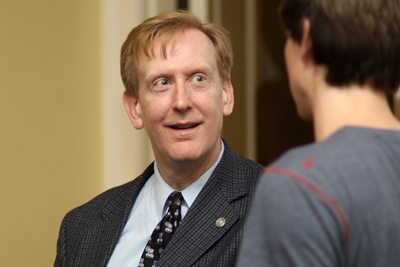
Steve Charles—One of the perks of editing what some folks call an “alumni magazine” (I prefer “college magazine”) is continuing education: For 17 years now I’ve carried on conversations with some of the brightest and most accomplished graduates of Wabash, learning not only what they know about their given fields and the path they’ve followed to their vocations, but also what good men they are.
One of the frustrations of editing an alumni magazine (and perhaps this is the source of my frustration with that term and my preference for “college magazine”) is that these conversations are often carried out by phone or email or in person but off campus, so that students (the very reason this place exists), not the most loyal readers of “alumni magazines,” don’t get to know these guys.
And even when students do read about them, either in print or online, my words don’t do justice to the men or begin to convey what students would learn if they could spend even an hour with them.
But in the past three weeks, three of those men with whom I’ve carried on these long conversations—Ray Jovanovich ’84, Arun Muralidhar ’88, Rick Gunderman ’83—have been on campus. Next week another—Dan Simmons ’70—returns.
As I watch these homecomings, all that frustration is washed away. You can see a few of those moments here.

I first interviewed Arun by phone about 16 years ago after his mentor, Professor Emeritus of Religion Raymond Williams H’68, told me about him. (Arun tells me that although he never took a religion class here, he feels as though he minored in religion thanks to the time he spent learning from Raymond.)
Arun had majored in economics, graduated from Wabash in three years, and quickly became a rising star at the World Bank. But by the time I talked with him in 1996, he’d had a change of heart. He wanted to make a difference in peoples’ lives on the ground, face to face, so he left his position managing a $5 billion pension fund to teach kindergarten in India.
When I caught up with him nine years later, he’d gone through another successful transition (read about that here), and he was a husband and dad. He has since co-authored a book on Social Security Reform with a Nobel Prize winner and started companies and earned an international reputation as a pension fund innovator. He spoke to students Monday about social security reform at a public lecture, spent time in classes, was welcomed back not only by faculty but by Crawfordsville folks who took him into their homes through the Community Friends program. He also did a short video for the Web site that’s up now, certainly one of the best of that series, and when I went to take him to that interview he was eating lunch with two econ students; they seemed to realize the value of that hour they had spent together.

I first met Dr. Rick Gunderman on campus relatively recently—2006—but it was one of those talks that changed the way I looked at the world. Two years later at the Big Bash Reunion here I watched him change the way my family doc, Dr. John Roberts, was looking at the world, and that change was at least part of the catalyst behind John’s work helping to establish the Montgomery County Free Clinic. It’s hard to find a better example of the value of a liberal arts education; he’s a man you want students to hear (a man I want my kids to hear!), and Monday night he was as thoughtful, insightful, candid, and provocative as ever. (Click here for a piece we reprinted from his book, We Make a Life by What We Give.)
Ray Jovanovich and I first met by phone in 1997, a few years after he’d been named “Fund Manager of the Year” for his work investing from his office in Hong Kong. Over the years I’d ask him for updates or he’d send me short perspective pieces from his front row seat in the most dynamic economic transition in history, then I’d post them on the Web site or in WM.
So many times I had wished he could take this knowledge directly to students and professors here, but when that moment finally happened and he returned to Wabash for a public talk on the Chinese economy, I walked right by him in Center Hall. Ray had shaved his beard, let his hair grow out to celebrate his retirement; he looked nothing like the photos we’d run of him in the magazine. And our 16 years of conversation had been by phone and email— he had no idea what I looked like. Professor David Blix began to introduce us when I figured it out—there was that moment of recognition you feel for an old friend, the names spoken aloud; we started to shake hands, then embraced.
And that’s the way it felt when students and current faculty finally had the chance to meet Ray—that they, that his alma mater, in fact, embraced each other. Learned from and were inspired by each other.
Watching Ray and students striking up spontaneous conversations as he walked around campus, or Arun meeting with two students for an hour long lunch, or the students gathered around the podium with Rick, talking, laughing, listening after his talk in Baxter 101, I thought of Professor Bill Placher’s words: “Sometimes the best way we show our love to the world is to love with a particular passion a little part of it.”
I know the place Bill loved, and the longer I’m here, the better I understand why.